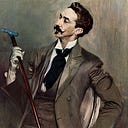Lust For Life: Gide’s The Immoralist
Gide’s first published piece of fiction asks deep queries about life
At first glance, André Gide’s The Immoralist (1902; Fr: L’Immoraliste) is not a remarkable French novel: plenty of French novels revolve around brooding solitary Frenchmen struggling to find the meaning of life (these category includes novels as diverse as Chateaubriand’s René, Huysman’s Against the Grain, Camus’ The Stranger and Sartre’s Nausea). Even within Gide’s bibliography The Immoralist inevitably appears as unimpressive, as it has none of the grandiosity and literary experimentation of The Counterfeiters nor the polemics of his various autobiographical texts. Nonetheless, for a relatively accessible book with a straightforward narration Gide’s brief novel is invested in a great philosophical question: what is life? Or, perhaps, what counts as living? This is a question that every human has posed about their own life and one that perhaps is unanswerable. Yet Gide still tries to offer a solution to this dilemma through the uncharismatic protagonist of this tale.
The Immoralist begins with a friend telling to his friends the story of his mutual friend Michel. Michel had a sheltered, privileged life in France. His Protestant mother raised him austerely while his father encouraged him to follow his footsteps asa historian of ancient Rome. This unusual upbringing is to blame for why Michel has no clue what to do with his life after his father’s death (his mother had died when he was a teenager). Michel’s father arranged for him to marry a kind girl named Marceline, towards whom he doesn’t feel much love at first. In fact, a terrible illness stops him from feeling much altogether as he embarks on a honeymoon trip to North Africa with Marceline.
Things started to look up for Michel when he becomes inspired to become healthy by a group of vigorous children in an Algerian town. Their careless way of living appears marvelous to him, a man who knows very little of leading a non-bookish lifestyle. After a self-imposed diet and exercise regiment, he becomes enamored with life. While stopping in Italy on his way back to France, he discovers he is madly in love with his wife. He then goes back to his father’s estate in Normandy and takes a pleasure in learning how to administer it from Charles, the son of the man who his father had hired to manage his land. Eager to share his new outlook in life, he uses a new teaching position he obtained at the renowned Collège de France to deliver a series of lectures on classical history that praise the free spirit of the Goths who invaded Italy. Unfortunately, the public (asides from a quirky professor named Ménalque who is about to leave Paris) doesn’t react well to the suggestion that culture and civilizations are perhaps not positive developments for humankind. Shortly after Marceline has a miscarriage and becomes seriously ill. After a brief séjour in Switzerland with the hopes that the clean air of the Alps would heal her, Michel takes Marceline back to North Africa; while the main intention is to cure Marceline, what Michel truly wants is to replicate the joy he felt when he first met those carefree children of his honeymoon. Unfortunately, these children have grown up. Marceline’s subsequent death has completely gotten rid of any semblance of organization in Michel’s life, and he lives aimlessly in North Africa until his friends respond to his call.
Gide’s novel has mostly been looked through the lenses of psychology, history and postcolonial theory. All of these interpretations are fascinating in their own right — the first looks at how Michel’s upbringing eventually led to chaos, the second analyzes the novel in relation to Gide’s own trips to North Africa and his involvement with minors there, and the third looks at how North Africa often stands for sexual desire and lawlessness in the European imagination. The reading I propose goes well with these: The Immoralist tells the story of a man who has found out he has not been living the most pleasurable life possible and who feels he must fix this through infinite trips that offer all sorts of delights. This lifestyle, nonetheless, conflicts with the lifestyle the European bourgeoisie has prepared for him. This conflict culminates in Michel’s desperate plea for help. The sociohistorical conditions of the time and the psychological state of the protagonist are definitely to blame for this outcome, but so is his lust for life that just can’t be accommodated. We don’t inhabit a world that is in its basic organization that different from that of Michel, and therefore we keep asking similar questions. If living life means indulging in pleasure, how do we achieve that if we also want to preserve orderly lifestyles that please our loved-ones?
